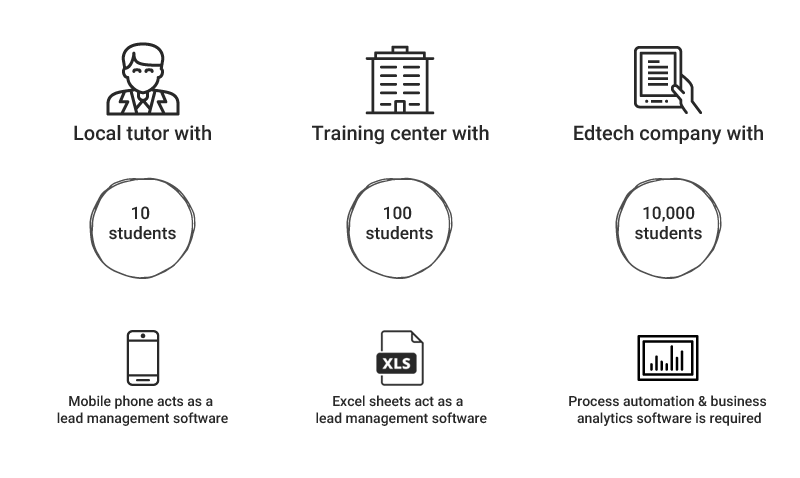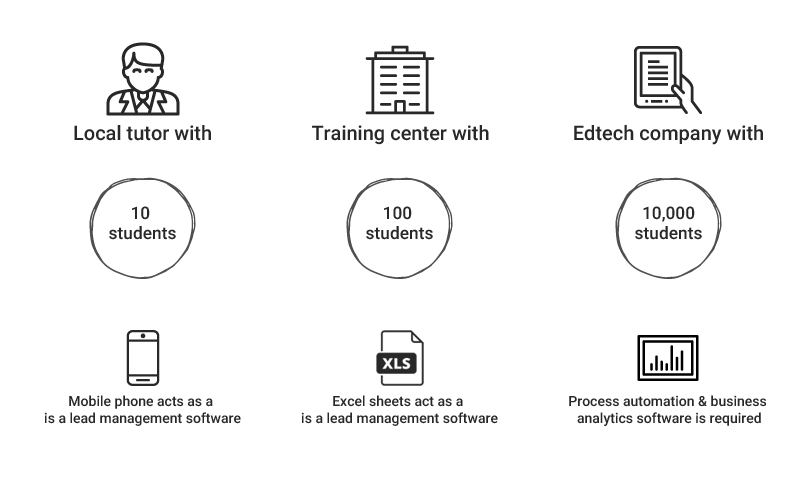I would like to start by saying that every business uses lead management software differently. Even businesses that look very similar may implement it differently, because their processes and needs may differ.
In some cases, something as simple as your mobile phone can act as your lead management software, and in others you would need a complex CRM lead management system to manage your leads. This difference depends largely on the industry and the size of the business.
Let’s take an example:

An online tutor with 10 students and a handful of inquiries can make do with a mobile phone as his lead management software as compared to a large EdTech marketplace that has hundreds of students enrolling everyday.
The situation can of course change, if the online tutor becomes famous and a lot of inquiries start coming in. Or, if the local training center opens another branch at a different location. Both the tutor and the training center would need much more than a mobile phone to manage the inquiries now, and turn them into sales.
Which is the best Lead Management Software for your needs?
Before you start looking for a lead management software you should sit down and draw your lead management process. Only after that, should you look for different vendors, and try to map your requirements with their features.
Below are some questions that’ll help you get some clarity on what you might actually need.
Q1. What’s the purpose of implementing sales lead management software?
First things first, what’s purpose of the lead management software? Start by listing down the things you want to achieve with it. It could be either or all of the following:
1. Increase sales
Here, the aim of the lead management software is to combine sales and marketing efforts to converge to a common goal – Increase Sales. Apart from acting like a lead database, the system tracks the activities of all the leads, and triggers marketing actions like sending offers and promotions via email and SMS. Sales is notified when a lead performs an important action like : checking out the pricing and spending a lot of time on the sales centric pages.
2. Increasing the number of leads
Not everybody can, or wants to sell on the first go. Some companies would need to gather data first from various channels and then strike their conversation by periodic emails or SMSs. Such companies would often look out for a solid lead capture mechanism from all the major lead generation channels and integration with tools like surveys, popups and other lead capture widgets.
3. Analytics
Most companies want to get insights of what’s going on in the lead funnel. For example – the sources generating the most revenue, the conversion analytics at each stage, the points where the communication is lagging, the response time of the sales rep etc. These insights are invaluable in strengthening the whole lead management process. The requirement of such kind of lead management software is to have access to powerful and customized reporting.
Q2. Does the lead management software mould to my business?
Since the lead management process differs for each business, you need to make sure that the system you implement is flexible enough to adapt to your existing business process.
For example: If you are a financial organization and want to sell insurance policies, you would like to map the lead attributes like government identification number, salary etc. After that, you might want to validate those details within your lead management software. You should check out if your online lead management software maps these lead attributes correctly.
Apart from that, you should really check if your lead management CRM maps your customer stages well. I have seen businesses using more than 20 lead stages. Make sure you have them covered right from the onset, because once you have 100,000 leads mapped to different stages, and different rules set to move the leads between stages, remodeling the stages is not going to be easy.
[Also read: retail lead management CRM software: features and benefits]
Q3. Does my lead management software capture leads from all my major lead sources?
Today there are infinite channels for lead generation and that is only going to increase. Whether you want to increase the sales, or expand your database, lead capture automation remains one of the most sought out features in a lead management system.
Make sure you have the capability to automate lead capture from all your major lead generation sources. Apart from email, telephone and chat, you should also consider lead capture from the lead aggregator websites depending on your industry. You have other paid and unpaid sources to think of as well – Google Ads, Instagram Ads, Facebook Ads etc, your content resources etc.
Q4. Do I have a field sales team to manage?
This is a vital question to answer, because if your business heavily relies on a field sales team, then you need to be able to track the team’s activities as well.
A field sales team might be responsible for going from shop-to-shop and recruiting new customers / partners for you. For example: A business that relies on local vendors. Or, they might simply be responsible for going and demonstrating your product to the already interested prospects. For example: Software businesses with a complex offering, or large sized deals where customized solutioning is needed.
If such is the case, your sales lead management software should allow your field sales reps to manage leads from their hand-held devices, because a laptop might become impractical – both logistically and cost-wise. So, your online lead management software should have the provision to:
- Enter lead data while on the move from a mobile app.
- Capture even incoming calls as leads.
- While on the move, allow the reps to check the lead details, their interests and their exact requirements because on-the-spot solutioning might be needed.
- Set tasks, and check their meeting calendars on their phones.
- Make them more efficient, because working on a mobile app while on the go is going to be easy than using a laptop.
It would also allow, you, as their manager to :
- Track their locations to see if they are actually attending the meetings they are supposed to attend.
- Analyze their performance based on the number of meetings attended everyday (if logging their activities is too time-consuming, your reps would avoid doing it, messing your reports up).
- Create a better incentive structure for them, because you’d be able to compare the distance they traveled, the meetings they attended, against the actual deals they closed.
Therefore, if you have a field sales set-up, your sales lead management software should be able to handle and sync the data across devices.
Q5. Do I have a multi-center organization?
For a multi-center organization you would need a lead distribution feature in your cloud-based lead management software. It makes it easier for the leads to travel without manual intervention.
Again, if you work with a multi-center, setup, it becomes very important to manage certain things, to avoid manual errors, and increase efficiency. Your system should be able to:
- Distribute leads automatically using location and other lead attributes to directly distribute leads to particular centers and salespeople. This avoids manual errors, makes the prospect experience better (because sometimes, communicating in local language might be needed), and reduces manual intervention, making the lead assignment instant, thereby reducing the response time.
- Show you analytics for different centers, so that you are able to analyze if a particular center is getting you the return you expect on the amount you are investing there.
- It should also be able to show you the centers performing the best, and the worst, so that you are able to plan your next action.
- Have a central lead management in place, but still restrict users from viewing confidential information. For example: You might not want to allow sales managers from one center to view or modify the data for another center.
So, once again, these are a few things your lead management software must be able to take care of; if you have to manage your multi-location organization on it.
So, before I close this chapter, I hope you now know the importance of understanding your individual business process, mapping out all the elements you would need, and then heading out in the pursuit of a good lead management software. Otherwise, you might find yourself running in circles, dissatisfied or limited in one feature or other.
Does all of this sound exactly like a general CRM system? What’s the difference. Let’s find out in the next chapter.









